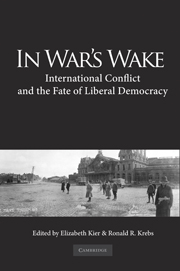Book contents
- Frontmatter
- Contents
- List of Contributors
- Acknowledgments
- 1 Introduction
- PART I WAR AND DEMOCRATIC TRANSITIONS: NEW AND DURABLE DEMOCRACIES?
- PART II WAR AND DEMOCRATIC PUBLICS: RESHAPING POLITICAL PARTICIPATION?
- PART III WAR AND DEMOCRATIC STATES: GOVERNMENT BY THE PEOPLE OR OVER THE PEOPLE?
- 9 International Conflict and the Constitutional Balance
- 10 Claims and Capacity
- 11 War, Recruitment Systems, and Democracy
- 12 Concluding Reflections
- References
- Index
12 - Concluding Reflections
What Wars Do
Published online by Cambridge University Press: 05 June 2012
- Frontmatter
- Contents
- List of Contributors
- Acknowledgments
- 1 Introduction
- PART I WAR AND DEMOCRATIC TRANSITIONS: NEW AND DURABLE DEMOCRACIES?
- PART II WAR AND DEMOCRATIC PUBLICS: RESHAPING POLITICAL PARTICIPATION?
- PART III WAR AND DEMOCRATIC STATES: GOVERNMENT BY THE PEOPLE OR OVER THE PEOPLE?
- 9 International Conflict and the Constitutional Balance
- 10 Claims and Capacity
- 11 War, Recruitment Systems, and Democracy
- 12 Concluding Reflections
- References
- Index
Summary
What do wars do? They obviously kill and destroy, but ever since Weber and Hintze, if not before, we have known that they do much more. These authors noted the centrality of war and military organization for the political, social, and economic development of the broadly defined “West.” More recently, Charles Tilly has argued that without war, the contemporary state would be unimaginable. The authors in this volume have sought to establish a more precise position: that there exists a positive link between war and democracy.
Such an argument seems paradoxical on many levels. Given our general positive view of democracy, how can it arise from the squalidness, violence, and injustice of war? Given the chaos and destruction that accompanies conflict, how can it produce something as dependent on rules as democracy? And yet the historical evidence does indicate a link.
Proponents of the war-democracy axis often rely on broad correlation rather than direct causation. Simply put, in certain periods and in certain places there were a lot of wars, and afterward there were more democracies than before. Small-n studies allow a better handle on how the specific policies that accompanied a country being at war later led to more progressive measures in one sphere or another. Even rigorous statistical testing does not falsify the claim, but merely suggests that the relationship may be more complex than some attest.
- Type
- Chapter
- Information
- In War’s WakeInternational Conflict and the Fate of Liberal Democracy, pp. 253 - 270Publisher: Cambridge University PressPrint publication year: 2010
- 4
- Cited by

